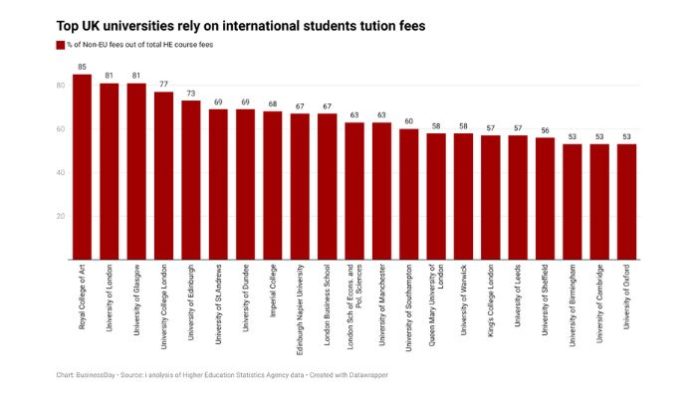Universities in the UK, heavily reliant on international tuition fees, have suffered a financial shortfall of over £1.2 billion in the past year due to a drop in international student numbers, according to the Centre for Economics and Business Research.
Research shows that international students who were granted visas from March 2023 to March 2024 paid approximately £26.9 billion in fees, down from £28.1 billion the previous year. This decline correlates with a decrease of 31,000 sponsored study visas issued, including to Nigerian students, bringing the total to 447,000 during the same period.
This drop in international applications has created an unstable funding situation, putting several UK universities at risk of closure, mergers, or significant cuts. Even prestigious institutions like Oxford and Cambridge are reportedly feeling the financial strain.
### Impact of Immigration Policies
The funding crisis is linked to changes in UK immigration policies under the Sunak-led government, which introduced stricter rules regarding stay and travel for those entering the country. This year, care workers and students—except for postgraduate students—were permanently barred from bringing dependents, and residents earning below £29,000 were prohibited from bringing families to the UK. Additionally, the salary threshold for skilled worker visas was increased by 48%.
Jo Grady, general secretary of the University and College Union (UCU), criticized the previous government for creating an unwelcoming environment for international students and staff, many of whom were forced to leave their families behind to study or work in the UK.
### Financial Risks for Universities
UCU has warned that unless institutions dramatically cut costs or merge, more universities in England may be forced to close in the coming years. It is estimated that 40% of universities in England are expected to run budget deficits this year, leading to job losses and the removal of some courses from the curriculum.
International students typically pay between £11,400 and £38,000 per year for undergraduate degrees, which provides significant income for universities. Unlike fees for UK nationals, which have been capped at £9,250 per year since 2017, international student fees are uncapped, making them a critical funding source for many institutions.
Some universities have already issued “risk of redundancy” letters to staff, offering voluntary resignation or limited reapplication options. In February, the University of Kent announced plans to cut 58 jobs and discontinue nine courses to address its financial challenges.
Grady highlighted the volatility of the current funding model, which has made universities increasingly dependent on a shrinking pool of international students.
###Decline in Nigerian Students
Data from the Home Office shows a 15% drop in international student visa applications as of July 2024 compared to the previous year, with Nigeria also experiencing a decline. The University of Oxford’s Migration Observatory identified Nigeria as a significant source of international students, with over 44,000 Nigerian students receiving study visas in 2021/22, making the country the third largest contributor after India and China.
However, the depreciation of Nigeria’s currency has made it more challenging for Nigerian students to pay tuition fees abroad. This has led to a 49% drop in Nigerian applicants through The Universities and Colleges Admissions Service (UCAS), falling from 5,020 last year to 2,570 this year.
This decline poses a severe threat to university staff and institutional finances. Grady emphasized the need for emergency funding from the Labour government to protect jobs and support struggling universities.



